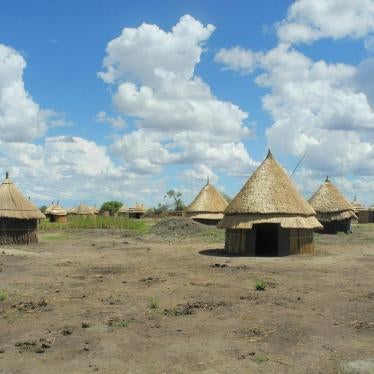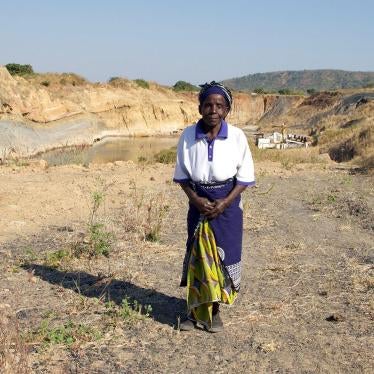(London) – The Ethiopian government under its “villagization” program is forcibly relocating approximately 70,000 indigenous people from the western Gambella region to new villages that lack adequate food, farmland, healthcare, and educational facilities, Human Rights Watch said in a report released today. State security forces have repeatedly threatened, assaulted, and arbitrarily arrested villagers who resist the transfers.
The report, “‘Waiting Here for Death’: Forced Displacement and ‘Villagization’ in Ethiopia’s Gambella Region,” examines the first year of Gambella’s villagization program. It details the involuntary nature of the transfers, the loss of livelihoods, the deteriorating food situation, and ongoing abuses by the armed forces against the affected people. Many of the areas from which people are being moved are slated for leasing by the government for commercial agricultural development.
“The Ethiopian government’s villagization program is not improving access to services for Gambella’s indigenous people, but is instead undermining their livelihoods and food security,” said Jan Egeland, Europe director at Human Rights Watch. “The government should suspend the program until it can ensure that the necessary infrastructure is in place and that people have been properly consulted and compensated for the loss of their land.”
The government says the “villagization” program is designed to provide “access to basic socioeconomic infrastructures” to the people it relocates and to bring “socioeconomic & cultural transformation of the people.” But despite pledges to provide suitable compensation, the government has provided insufficient resources to sustain people in the new villages, Human Rights Watch said.
The residents of Gambella, mainly indigenous Anuak and Nuer, have never had formal title to the land they have lived on and used. The government often claims that the areas are “uninhabited” or “under-utilized.” That claim enables the government to bypass constitutional provisions and laws that would protect these populations from being relocated.
The report is based on more than 100 interviews in Ethiopia in May and June 2011, and at the Ifo refugee camp in Dadaab and Nairobi, Kenya, where many Gambellans have fled.
“My father was beaten for refusing to go along [to the new village] with some other elders,” a former villager told Human Rights Watch. “He said, ‘I was born here – my children were born here – I am too old to move so I will stay.’ He was beaten by the army with sticks and the butt of a gun. He had to be taken to hospital. He died because of the beating – he just became weaker and weaker.”
The Villagization Program
The Ethiopian government is planning to resettle 1.5 million people by 2013 in four regions: Gambella, Afar, Somali, and Benishangul-Gumuz. Relocations started in 2010 in Gambella, and approximately 70,000 people there were scheduled to be moved by the end of 2011. Under the Gambella Peoples’ National Regional State Government Plan, 45,000 households are to be moved during the three-year program. The plan pledges to provide infrastructure for the new villages and assistance to ensure alternative livelihoods. The plan also states that the movements are to be voluntary.
Instead of improved access to government services, however, new villages often go without them altogether. The first round of forced relocations occurred at the worst possible time of year – the beginning of the harvest – and many of the areas to which people were moved are dry with poor-quality soil. The nearby land needs to be cleared, and agricultural assistance – seeds and fertilizers – has not been provided. The government failure to provide food assistance for relocated people has caused endemic hunger and cases of starvation.
Human Rights Watch’s research showed that the forced relocation policy is disrupting a delicate balance of survival for many in the region. Livelihoods and food security in Gambella are precarious. Pastoralists are being forced to abandon their cattle-based livelihoods in favor of settled cultivation. Shifting cultivators – farmers who move from one location to another over the years – are being required to grow crops in a single location, which risks depleting their soil of vital nutrients. In the absence of meaningful infrastructural support and regular supplies of food aid, the changes for both populations may have life-threatening consequences, Human Rights Watch said.
The resident of one new village told Human Rights Watch: “We expect major starvation next year because they did not clear in time. If they [the government] cleared [the land] we would have food next year but now we have no means for food.”
Commercial Land Investment
The villagization program is taking place in areas where significant land investment is planned or occurring. The Ethiopian government has consistently denied that the resettlement of people in Gambella is connected to the leasing of large areas of land for commercial agriculture, but villagers have been told by government officials that this is an underlying reason for their displacement. Former local government officials confirmed these allegations to Human Rights Watch.
One farmer told Human Rights Watch that during the government’s initial meeting with his village, government officials told them: “We will invite investors who will grow cash crops. You do not use the land well. It is lying idle.”
“We want you to be clear that the government brought us here… to die... right here,” one elder told Human Rights Watch. “We want the world to hear that government brought the Anuak people here to die. They brought us no food, they gave away our land to the foreigners so we can’t even move back. On all sides the land is given away, so we will die here in one place.”
Mass displacement to make way for commercial agriculture in the absence of a proper legal process contravenes Ethiopia’s constitution and violates the rights of indigenous peoples under international law.
From 2008 through January 2011, Ethiopia leased out at least 3.6 million hectares of land, an area the size of the Netherlands. An additional 2.1 million hectares of land is available through the federal government’s land bank for agricultural investment. In Gambella, 42 percent of the total land area is either being marketed for lease to investors or has already been awarded to investors, according to government figures. Many of the areas that have been moved for villagization are within areas slated for commercial agricultural investment.
“The villagization program is being undertaken in the exact same areas of Ethiopia that the government is leasing to foreign investors for large-scale commercial agricultural operations,” Egeland said. “This raises suspicions about the underlying motives of the villagization program.”
Role of Foreign Donors
Foreign donors to Ethiopia, including the United Kingdom, United States, World Bank, and European Union, assert that they have no direct involvement in the villagization programs. However, the multi-donor Protection of Basic Services (PBS) program subsidizes basic services – health, education, agriculture, roads, and water – and local government salaries in all districts in the country, including areas where new villages are being constructed and where the main activity of local governments is moving people.
As a result of their potential responsibilities and liabilities, donors have undertaken assessments of the villagization program in Gambella and in Benishangul-Gumuz and determined that the relocations were voluntary. Human Rights Watch’s field-based research and interviews with residents, however, indicates that the moves have been coerced.
International donors should ensure that they are not providing support for forced displacement or facilitating rights violations in the name of development, Human Rights Watch said. They should press Ethiopia to live up to its responsibilities under Ethiopian and international law, namely to provide communities with genuine consultation on the villagization process, ensure that the relocation of indigenous people is voluntary, compensate them appropriately, prevent human rights violations during and after any relocation, and prosecute those implicated in abuses. Donors should also seek to ensure that the government meets its obligations to respect, protect, and fulfill the economic and social rights of the people in new villages.
“It seems that the donor money is being used, at least indirectly, to fund the villagization program,” Egeland said. “Donors have a responsibility to ensure that their assistance does not facilitate forced displacement and associated violations.”
Selected Accounts from “Waiting Here for Death”
“We were told, ‘If somebody refuses, the government will take action’ – so the people went to the new village – by force.”
–Villager in Abobo woreda (district), May 2011
“Farmers in our woreda did not want to go. The woreda reported to the region that farmers are refusing to accept. The governor asked the woreda chairman to investigate. He did – ‘Yes, they are resisting. What shall we do?’ he asked the governor. The governor told him that five development agents should be suspended from their job, and that he would bring in the soldiers. So that is what happened.”
–Former woreda civil servant, June 2011
“The government is killing our people through starvation and hunger. It is better to attack us in one place than just waiting here together to die. If you attack us, some of us could run, and some could survive. But this, we are dying here with our children. Government workers get this salary, but we are just waiting here for death.”
–Elder in recently relocated village, Abobo woreda, May 2011
“There is a psychological impact on children. No learning is happening. There was a school in the old village, here there is none. No one is going to school now, as they are afraid. Who will protect them going to the old village? Even the children themselves are refusing to go.”
–Anuak woman from new village discussing the lack of promised school in Abobo woreda, May 2011







